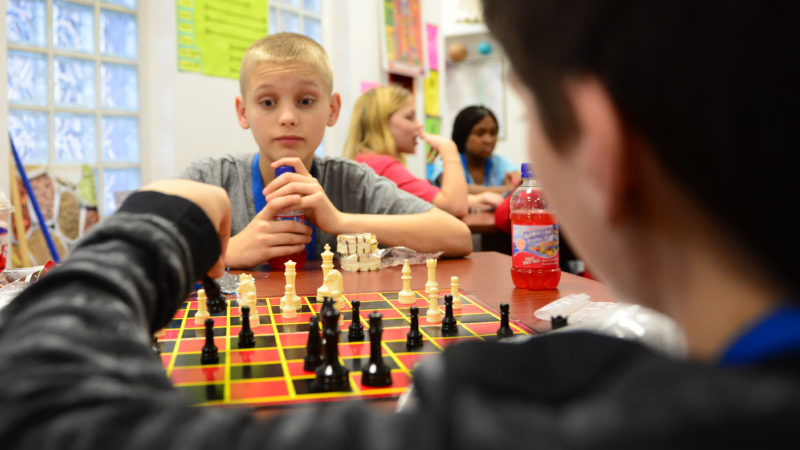Participation in after school activities like volunteering and debating is falling, especially among children from disadvantaged backgrounds.

Children from disadvantaged backgrounds are less likely to take part in extra-curricular activities that would help them develop essential life skills and become more employable, a new report has found.
There is a big gap between the number of activities schools say they have on offer and the take-up, especially among poorer pupils, the Sutton Trust said today, widening the gap between disadvantaged children and their more privileged peers.
Only 46% of pupils from lower socio-economic backgrounds were able to access activities like volunteering and debating that could help them get a job later on, polling by the National Foundation for Education found. This is compared to 66% of better off children.
While 78% of secondary school teachers across England claimed their institutions offered volunteering programmes to build their pupils’ life skills, just 8% of pupils aged 11-16 in England and Wales said they take part in these sorts of extra-curricular activities.
Similarly, 45% of secondary teachers said their school provided debating, yet just 2% of pupils reported taking part.
Almost two in five secondary pupils don’t take part in any extra-curricular activities run by their school.
Commenting on the Life Skills report, Sir Peter Lampl, Chairman of the Sutton Trust and of the Education Endowment Foundation, said that 90% of employers, teachers and young people believed life skills – such as confidence, articulacy, social skills and the ability to work well as part of a team – were as or more important than academic qualifications.
He said:
“These skills are crucial and everyone should have the opportunity to develop them.
“Independent schools by and large do an excellent job.
“It is vital that state schools embed the development of these skills in their ethos, curriculum and extracurricular activities.”
Of the young people polled, three-quarters believe that better life skills would help them get a job in the future, and 88% said these are as or more important than good grades.
However, only one in five (20%) said that their school curriculum helped them to develop their life skills ‘a lot’.
Meanwhile almost one-third (30%) of employers surveyed by YouGov said that life skills are more important than academic results – but many said they do not trust the education system to help students develop these competencies. Apprenticeships, most said, better prepare young people for work.
Kevin Courtney, joint general secretary of the National Education Union, said the report should have highlighted how pupils are not taking part in extra-curricular activities as much as in the past because of increasing academic pressure.
He said:
“Increasingly children and young people are expected to attend extra tutoring or exam cramming sessions in their lunch breaks, after school, on Saturdays and in the school holidays to ensure they achieve the grades required by the Government’s imposed league table targets.
“It is hardly surprising then that fewer children can make the most of the extra-curricular opportunities schools offer.
“The school accountability system needs to be radically overhauled so that schools can offer a rich, broad and exciting set of opportunities for all their young people both within the curriculum and in extra-curricular activities.
“In the current high-stakes system it is young people from disadvantaged backgrounds who are most likely to lose out.
Both the Sutton Trust and the National Education Union are calling on the government to make changes to education policy.
The Sutton Trust would like to see schools providing a broad array of life skills within regular lessons and through extra-curricular activities like debating and volunteering.
Focus should be on increasing participation from those less well-off, the trust said.
Charlotte England is a freelance journalist and writer at Left Foot Forward. Follow her on Twitter.
To reach hundreds of thousands of new readers and to make the biggest impact we can in the next general election, we need to grow our donor base substantially.
That's why in 2024, we are seeking to generate 150 additional regular donors to support Left Foot Forward's work.
We still need another 124 people to donate to hit the target. You can help. Donate today.




2 Responses to “Poor children missing out on chance to develop life skills, report finds”
Karl Greenall
Since Jim Callaghan’s Ruskin Speech, political thinking on education in this country has led to declining levels of real attainment. I do not use the word “standard”, because it’s use itself demonstrates the idiocy of it all. The main buzzword has been ” accountability” but, thanks to the overwhelming desire to deal with lowest possible common denominators, for political reasons only, our education system labours, at all levels, to attain targets of little real (human) value. The only good thing is that it is on the way to self-destruction. That means the chance to start again and do a proper job.
Judith
Offering free transport home for students who stay after school would make a huge difference to low income students attending extra-curricular activities, a free bus pass etc. Also using Pupil Premium/Disadvantaged Student funding for the actual students who receive it, so ring-fenced for each student in a budget… to be used for music lessons, kit and so forth.